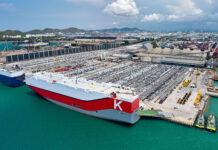
Port of Houston has decided to implement a Sustained Import Dwell Fee that is expected to go into effect on 1 February.
With this new fee, the US port aims to maintain fluidity at the Bayport and Barbours Cut Container Terminals and address long-term dwell.
The US$45 fee will be charged per unit per day starting on the eighth day after the expiration of free time, as defined in Tariff No. 15 Subrule 095 and Tariff No. 14 Subrule 093.
In its announcement, the port noted that this fee is in addition to the demurrage charges for loaded import containers provided for in those subrules and does not replace those charges.
Furthermore, containers will be on hold until all terminal fees are reconciled. It is also noted that payment of such fees will be the responsibility of the cargo owner.
“The Sustained Import Dwell Fee is intended to minimise long-term storage of containers on the terminals and promote fluidity of cargo movement,” pointed out Roger Guenther, executive director at Port Houston.
This past October, the Port Commission approved the new dwell fee structure in order to help reduce the amount of time containers sit on terminals.
Moreover, an excessive import dwell fee was also approved in October, which can be implemented by Port Houston’s executive director as needed.
If implemented, it will take effect following thirty days’ public notice and remain in effect for at least sixty days. However, it is not being implemented at this time.
Guenther said, “We’ve seen during the recent increase in demand that containers sitting on terminals for an extended period of time are a challenge. We are implementing this additional tool to help optimise space at our terminals and keep goods moving to the consumers in our region who need them.”





